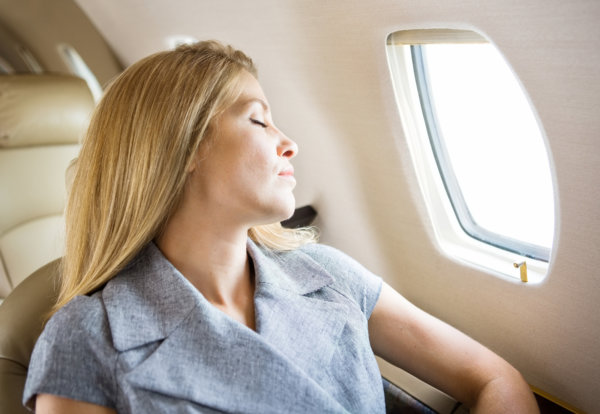
Tips to Overcome Jet Lag Symptoms and Sleep Well Abroad

Whether you’re holidaying somewhere delicious, or away for a work trip with only a concrete view to look at, being in a different time zone can wreak havoc on your normal sleep pattern, leaving you lethargic, irritable and headachy – typical symptoms of jet lag.
On average, most people need about seven to eight hours’ sleep each night, although some function on less. A good night’s sleep should leave you feeling refreshed and ready to tackle the day ahead, but even people who sleep soundly at home can be subject to sleep disruption when travelling.
Have you noticed that when you have a good night’s sleep, you feel refreshed, positive and able to cope with things better?“Sleep is essential to good mental wellbeing. If you don’t get enough sleep, you can feel moody and irritable – and over time this is likely to affect your relationships with people, your work and your mental wellbeing,” says Dr Mark Winwood, Director of Psychological Services at AXA PPP healthcare.
So what is jet lag?

When you’re travelling by plane and crossing into different time zones, your body’s normal circadian rhythm – your body clock – is disrupted.
Your biological clock is programmed to know when it’s morning and evening, so you get a sense of when to feel hungry and when to go to sleep. Being in a different time zone upsets this and it can take several days, or longer, to adjust.
Anyone can be affected by jet lag, even frequent flyers, but there are practical steps you can take to reduce the risk of it occurring.
Reducing the risk of jet lag before you travel:
“If you want to minimise jet lag, start preparing before you set off,” explains Dr Mark; “try and get some rest before your trip.”
It’s not uncommon to feel stressed before a holiday but try and remain as calm as possible, as stress can affect sleep.
“It may be tempting to take sleeping tablets for a long haul flight but they can reduce your level of movement and may increase the risk of deep vein thrombosis or DVT,” adds Dr Mark.
How to get over jet lag?

Sleeping throughout the journey may make time go faster for you but your body clock is unlikely to react so well.
If you’re keen to reduce jet lag and improve your ability to sleep when you arrive, we suggest these tips:
- Avoid eating too much or drinking alcohol, as both can cause drowsiness and alcohol causes dehydration.
- Cut down on caffeine consumption; drink water and other fluids to keep hydrated.
- Remaining active, especially on long flights; stretch your legs and arms and move around whenever possible.
- Alter your watch at the start of the flight, so you can begin adjusting to the new time zone.
- Get some sleep if it’s already night at your destination and use an eye mask and earplugs to block out light and noise; otherwise, try and stay awake so you can sleep at the proper time when you arrive.
On arrival, get into the local routine as soon as possible (e.g. if it’s breakfast time, eat breakfast!). Spend time outside during the day – the natural light helps your body clock adjust.
If you’re travelling for four days or less, aim to stay on ‘home time’ wherever possible, eating and sleeping at the same time as you would at home.
How to get a good night’s sleep on your travels?

To maximise the chance of getting enough sleep and to adjust quickly, make your new environment as ‘sleep friendly’ as possible. If you’ve got space, pack your pillow from home to help you sleep comfortably, and avoid drinking too much caffeine in the evening.
Where a hot climate – or room temperature – is an issue:
- Sleep under a cotton sheet
- Have a cool shower before bed to lower your body temperature
- Use a cooling facial spray (or a DIY small spray bottle filled with water) to spray on your skin and cool you down
- Have a fan on in the room; the ‘white noise’ it produces can also help block out background noises
- Keep the curtains closed during the day to prevent the room overheating.
At the very least, try and get a minimum of four hours’ sleep in a 24-hour period.












































